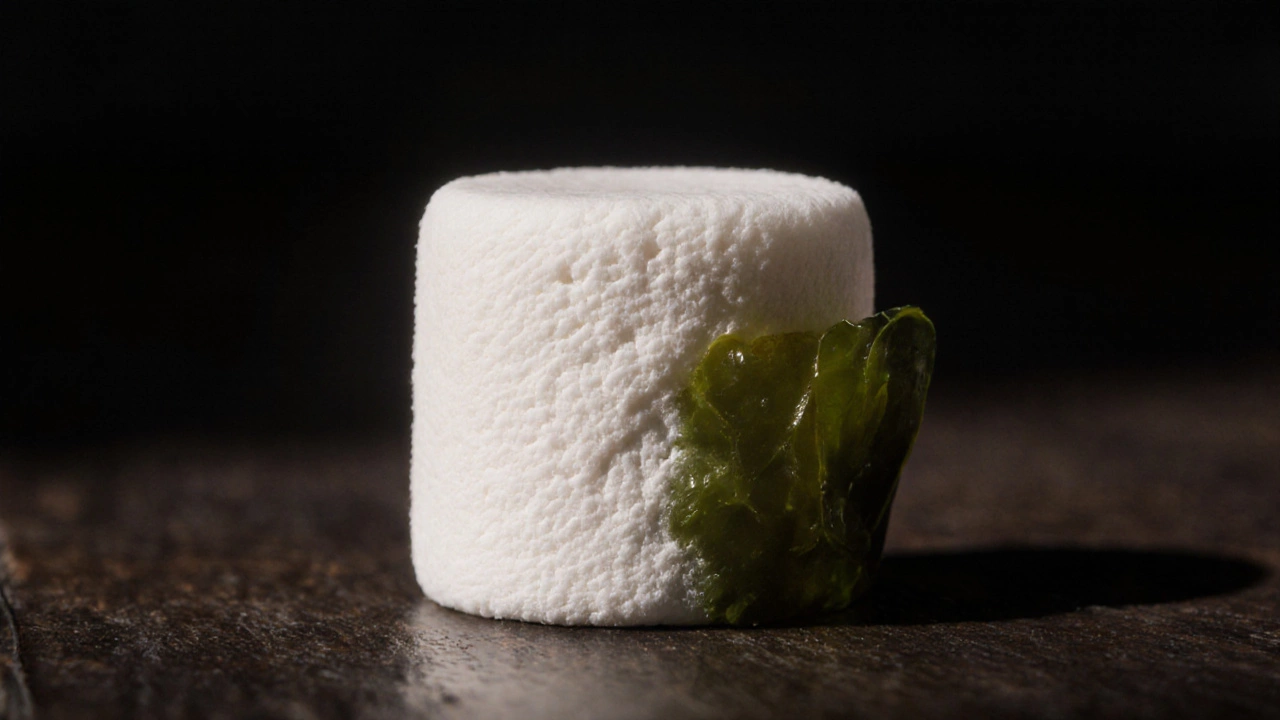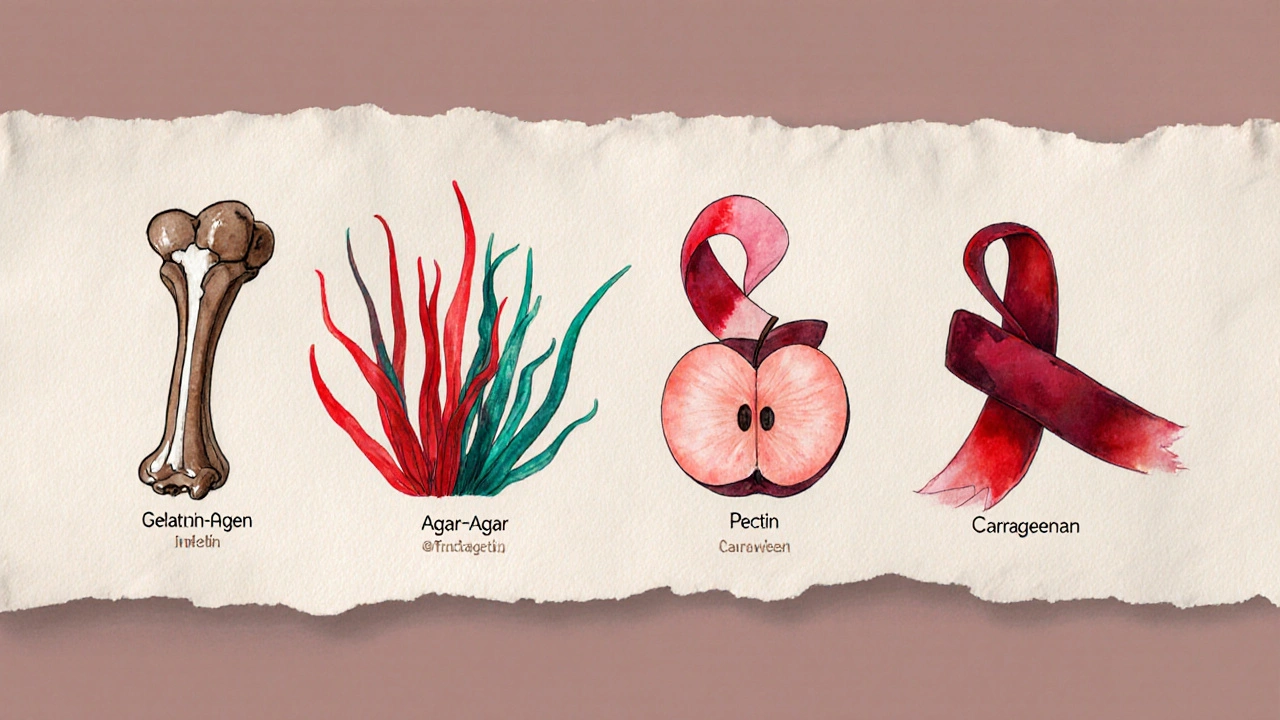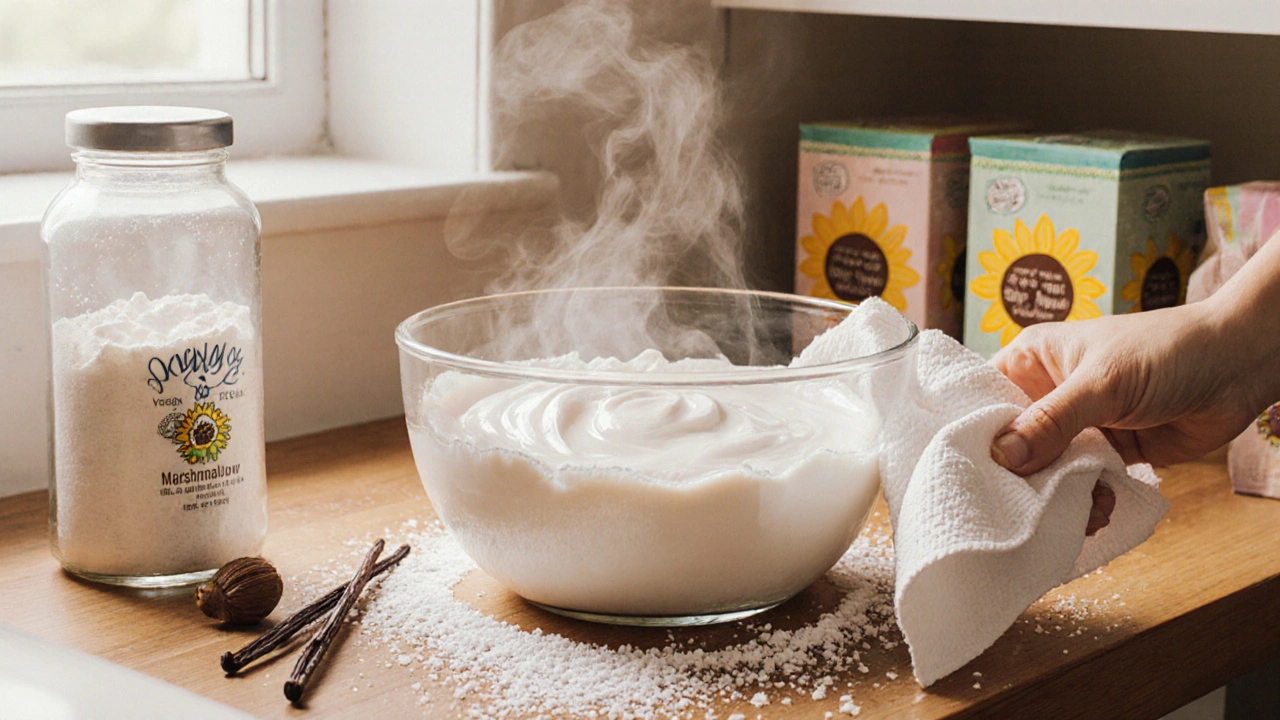
When you bite into a fluffy marshmallow, you probably aren’t thinking about the ingredient list. But for anyone following a plant‑based lifestyle, that simple treat can raise a big question: is it truly vegan marshmallows or does it hide hidden animal products?
Marshmallow is a soft confection made from sugar, water, gelatin or other gelling agents, and often flavored with vanilla. The classic recipe dates back to ancient Egypt, where honey was mixed with the sap of the marshmallow plant. Modern versions rely on industrial ingredients, and that’s where the vegan dilemma begins.
Why Traditional Marshmallows Aren’t Vegan
The biggest red flag is gelatin - a protein derived from the collagen in animal bones, skin, and connective tissue. Gelatin gives marshmallows their signature chew and the airy structure that melts in your mouth.
Besides gelatin, some brands add corn syrup (a liquid sweetener made from corn starch. While corn syrup itself is plant‑based, certain processing methods can involve animal‑derived enzymes, making the product non‑vegan in some jurisdictions.
Other animal‑derived additives that occasionally appear include confectioner’s glaze (a shellac‑based coating) and natural flavors extracted from animal sources.
Plant‑Based Gelatin Alternatives
Fortunately, a handful of gelling agents are 100% plant‑derived and work just as well in marshmallows.
- Agar‑agar - a seaweed extract that sets at higher temperatures than gelatin, giving a firmer bite.
- Pectin - a fruit‑derived fiber commonly used in jams; it creates a slightly softer texture.
- Carrageenan - another seaweed‑based thickener, though some vegans avoid it due to digestive concerns.
These alternatives are the backbone of every vegan marshmallow you’ll find in health stores or specialty aisles.
| Agent | Source | Setting Temp (°C) | Texture | Vegan Status |
|---|---|---|---|---|
| Gelatin | Animal collagen | 25‑30 | Classic springy | No |
| Agar‑agar | Red algae | 35‑40 | Firm, slightly crunchy | Yes |
| Pectin | Fruit cell walls | 30‑35 | Soft, melt‑in‑mouth | Yes |
| Carrageenan | Red seaweed | 40‑45 | Silky, smooth | Yes (some avoid) |
How to Spot Vegan Marshmallows on Store Shelves
Label reading is a skill every vegan needs, especially with candy where ingredients can be buried in fine print.
- Look for the word gelatin in the ingredients. If it appears, the product is off‑limits.
- Check for a “vegan” logo. In the UK, the Vegan Society’s sunflower symbol is the most trusted.
- Read the allergen information-sometimes gelatin is listed under “animal derivatives”.
- Search for plant‑based gelling agents: agar‑agar, pectin, carrageenan, or “vegetable‑based gelatin”.
- When in doubt, visit the brand’s website. Transparency pages often detail sourcing.
Remember that “natural flavor” can still be animal‑derived, so a truly vegan product will either specify “plant‑based natural flavor” or list the actual source (e.g., vanilla extract).

DIY Vegan Marshmallows: A Simple Recipe
Making your own sweets guarantees you know exactly what’s inside. Here’s a quick recipe that yields fluffy, melt‑in‑your‑mouth treats.
- 1cup sugar (granulated cane sugar.
- 1/3cup light corn syrup (ensure it’s labeled “plant‑based”)
- 1/4cup water
- 1tbsp agar‑agar powder
- 1tsp vanilla extract (plant‑based)
- Pinch of salt
Directions:
- Combine sugar, corn syrup, and water in a saucepan. Heat over medium until the mixture reaches 115°C (soft‑ball stage).
- Meanwhile, dissolve agar‑agar in 1/2cup cold water. Bring to a boil, then simmer for 2minutes to activate the gelling power.
- When the sugar syrup is ready, remove from heat and whisk in the agar mixture, vanilla, and salt. Using a stand mixer on high speed, beat for 8‑10minutes until the mixture triples in volume and becomes glossy.
- Quickly pour into a greased 8×8‑inch pan, smooth the top, and let set at room temperature for 30minutes.
- Cut into squares, dust with a mix of powdered sugar and a touch of cornstarch to prevent sticking.
The result is a classic marshmallow texture without a single animal ingredient.
Top Commercial Vegan Marshmallow Brands (2025)
If you’d rather buy ready‑made, here are the most reliable options you can find across the UK and Europe.
- Dandies - UK‑based, uses agar‑agar and organic cane sugar. Certified Vegan and Gluten‑Free.
- Vego’s Marshmallows - US brand, pectin‑based, free from artificial colors.
- SweetBand Marshmallows - European brand, carrageenan + agar blend, labelled “Vegan Friendly”.
- Trader Joe’s Vegan Marshmallows - US supermarket staple, uses a proprietary plant gelatin substitute, proven vegan.
Price points range from £2 for a 200g pack (Dandies) to £4 for specialty organic blends.

Common Pitfalls and How to Avoid Them
Even seasoned vegans can slip up. Here are the usual traps and quick fixes.
- Hidden gelatin in “marshmallow topping”. Ice‑cream shops often use traditional marshmallow fluff. Ask for a vegan alternative or bring your own.
- Cross‑contamination. Some factories produce both gelatin and vegan marshmallows on the same line. Look for “produced in a dedicated vegan facility” claims.
- Misleading “natural” claims. “Natural flavor” may be derived from animal sources. Opt for brands that specify the flavor source.
Frequently Asked Questions
Are all marshmallows automatically non‑vegan?
No. Traditional marshmallows contain gelatin, but many brands now use plant‑based gelling agents like agar‑agar or pectin, making them suitable for vegans.
Can I use regular marshmallows in vegan recipes?
Only if the marshmallows are certified vegan. Otherwise, they’ll introduce animal‑derived gelatin into your dish.
What’s the best vegan gelatin substitute for fluffy marshmallows?
Agar‑agar mixed with a small amount of pectin gives a texture close to the classic springy bite while staying fully plant‑based.
Are vegan marshmallows cheaper than regular ones?
They can be slightly pricier, especially if they’re organic or from a niche brand, but mainstream vegan packs are now comparable to standard supermarket prices.
Do vegan marshmallows taste different?
Taste is very similar. The main difference may be a slightly firmer bite when agar‑agar is used, but most people find them indistinguishable from traditional marshmallows.





